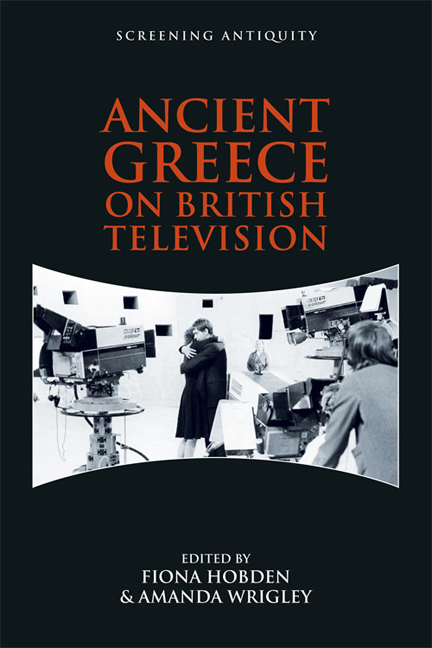Book contents
- Frontmatter
- Contents
- List of Figures and Tables
- Series Editors’ Preface
- Acknowledgements
- Contributors
- Abbreviations
- Broadcasting Greece: An Introduction to Greek Antiquity on the Small Screen
- 1 Are We the Greeks? Understanding Antiquity and Ourselves in Television Documentaries
- 2 Louis MacNeice and ‘The Paragons of Hellas’: Ancient Greece as Radio Propaganda
- 3 The Beginnings of Civilisation: Television Travels to Greece with Mortimer Wheeler and Compton Mackenzie
- 4 Tragedy for Teens: Ancient Greek Tragedy on BBC and ITV Schools Television in the 1960s
- 5 The Serpent Son (1979): A Science Fiction Aesthetic?
- 6 Don Taylor, the ‘Old-Fashioned Populist’? The Theban Plays (1986) and Iphigenia at Aulis (1990): Production Choices and Audience Responses
- 7 The Odyssey in the ‘Broom Cupboard’: Ulysses 31 and Odysseus: The Greatest Hero of Them All on Children’s BBC, 1985–1986
- 8 Greek Myth in the Whoniverse
- 9 The Digital Aesthetic in ‘Atlantis: The Evidence’ (2010)
- 10 Greece in the Making: From Intention to Practicalities in Television Documentaries. A Conversation with Michael Scott and David Wilson
- Bibliography
- Index
10 - Greece in the Making: From Intention to Practicalities in Television Documentaries. A Conversation with Michael Scott and David Wilson
Published online by Cambridge University Press: 24 April 2021
- Frontmatter
- Contents
- List of Figures and Tables
- Series Editors’ Preface
- Acknowledgements
- Contributors
- Abbreviations
- Broadcasting Greece: An Introduction to Greek Antiquity on the Small Screen
- 1 Are We the Greeks? Understanding Antiquity and Ourselves in Television Documentaries
- 2 Louis MacNeice and ‘The Paragons of Hellas’: Ancient Greece as Radio Propaganda
- 3 The Beginnings of Civilisation: Television Travels to Greece with Mortimer Wheeler and Compton Mackenzie
- 4 Tragedy for Teens: Ancient Greek Tragedy on BBC and ITV Schools Television in the 1960s
- 5 The Serpent Son (1979): A Science Fiction Aesthetic?
- 6 Don Taylor, the ‘Old-Fashioned Populist’? The Theban Plays (1986) and Iphigenia at Aulis (1990): Production Choices and Audience Responses
- 7 The Odyssey in the ‘Broom Cupboard’: Ulysses 31 and Odysseus: The Greatest Hero of Them All on Children’s BBC, 1985–1986
- 8 Greek Myth in the Whoniverse
- 9 The Digital Aesthetic in ‘Atlantis: The Evidence’ (2010)
- 10 Greece in the Making: From Intention to Practicalities in Television Documentaries. A Conversation with Michael Scott and David Wilson
- Bibliography
- Index
Summary
On a sunny summer's afternoon in 2015, Fiona Hobden, one of the editors of this book and a specialist from the University of Liverpool in ancient world documentaries, met with the ancient historian Dr Michael Scott, Associate Professor at the University of Warwick, and David Wilson, a director and producer of documentary films, at the Institute of Classical Studies in London. This chapter presents an abridged and edited version of their conversation. In it Scott and Wilson discuss their experiences making documentaries about ancient Greece for television. Having recently worked together on Delphi: The Bellybutton of the Ancient World (2010), Guilty Pleasures: Luxury in Ancient Greece (2011) and Ancient Greece: The Greatest Show on Earth (2013) for BBC4,2 the pair offer insights into factors that influence the representation of ancient Greece on screen across the production process. From the commissioning stage through to writing and filming, that process is characterised by a continual negotiation between initial intent, the varying goals of television documentaries, the opportunities attendant upon telling a story through an audiovisual medium, and on-the-ground practicalities during filming, with every decision informed by budgetary constraints. As the conversation unfolds, Scott and Wilson also reflect on the characteristics and value of ancient Greece on television.
GETTING STARTED
Fiona Hobden (FH): What first drew you to making television documentaries about ancient Greece?
Michael Scott (MS): I come at this from the point of view of a university lecturer in a Classics department, focused on studying the ancient Greek and Roman world. For me, being an academic is also fundamentally about speaking to communities outside of the academic world, to explain why I and others spend our time studying that world and encourage more people to learn about it. And that's what drove me from the very beginning, post-PhD level onwards, to always try to find ways of doing that. My particular research focus is ancient Greece, and my PhD focus was Delphi. In 2009/10, having done a number of small host or interview roles for different programmes on the History Channel, including their Ancient Discoveries and Ancient Rulers series, I heard that the BBC were doing an ‘Ancient Greece’ season. But you cannot simply go to a channel and say ‘This is what I want to do.
- Type
- Chapter
- Information
- Ancient Greece on British Television , pp. 203 - 223Publisher: Edinburgh University PressPrint publication year: 2018



